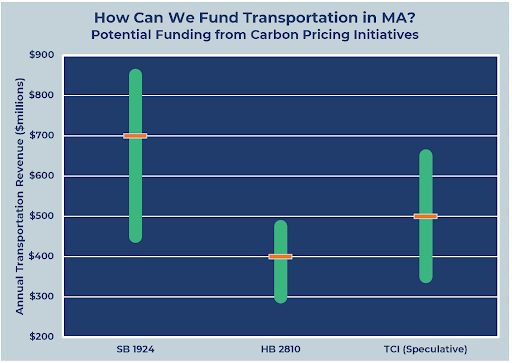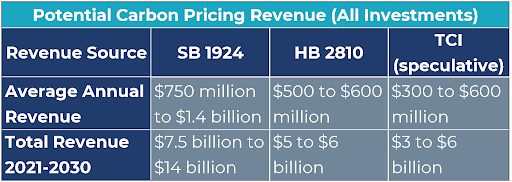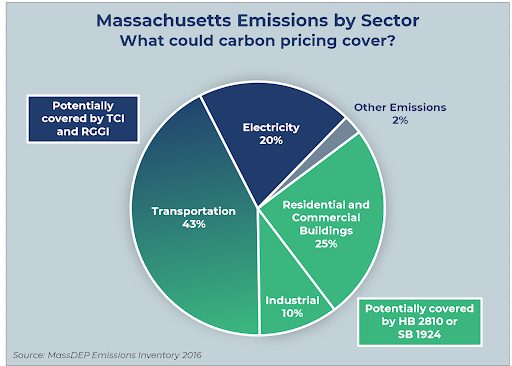2019 could be a big year for climate policy in the Commonwealth. Between House and Senate bills, and executive branch action, there are a multitude of initiatives, each with their strengths and weaknesses, that put a price on carbon emissions and raise money to invest in our communities. Enacting some, or all of these proposals, could allow Massachusetts to rejoin the ranks of ambitious climate leaders that have already taken initiative this year.
At the same time, the state’s transportation needs continue to multiply. The city of Boston has faced serious equity challenges in how public infrastructure has underserved some of the city’s most vulnerable communities. Understanding the ways city development and social inequalities have left some residents more vulnerable to the impacts of climate change, continues to be crucial for understanding climate change as a social justice and equity issue.
More recently, the city’s transportation woes have worsened. Boston is now the most congested city in the U.S., and the only U.S. city to rank in the top 10 worldwide. As traffic has continued to worsen, so have our budget woes. Without even considering major expansion projects, the state faces an $8+ billion funding gap over the next 10 years for repairing roads, bridges, and MBTA infrastructure. Residents and businesses are calling on the state to reimagine how we move people and goods around.
Enter carbon pricing. The Massachusetts dilemma presents a perfect opportunity for us to craft policies that simultaneously reduce emissions from our most pollutive sector, while addressing the transportation needs and equity challenges of the Commonwealth. But how much money could the pending proposals raise, and how should we be talking about them?
The Revenue Breakdown

The green line represents the range of possible outcomes for annual transportation revenue, while the orange point represents the most reasonable estimate for each proposal. Note that TCI revenue is speculative, as no program design details are finalized yet.
It is also worth noting that both carbon pricing bills are economy-wide, while TCI is transportation-only. These bills raise additional revenue, not included in the graph above, that is directed towards renewable energy, household efficiency, resilience, and other community needs. When all uses of revenue are included, these bills start to pull away from TCI in terms of total investment funds.

Furthermore, these revenues are not mutually exclusive – as is explained below, both carbon pricing bills in Massachusetts are designed to be compatible with the Transportation Climate Initiative.
At the end of the day, all proposals considered have the potential to raise billions of dollars over the coming decade to help address our transportation needs whilst incentivizing a cleaner economy in Massachusetts. Keeping our emissions on track this next decade and fixing the deep transportation equity issues of the state will require following through on some, or all of these policies as soon as possible. With that, there are some strengths and weaknesses of each approach.
Transportation Climate Initiative
The Transportation Climate Initiative is a regional cap-and-trade system under development in the Northeast and Mid-Atlantic. The governors of these states, which currently include Connecticut, Delaware, Maryland, Massachusetts, New Jersey, Pennsylvania, Rhode Island, Vermont, Virginia, and Washington DC, have tasked themselves with completing the program’s design by the end of this year. Unlike the other initiatives on this list, it doesn’t require passage by the legislature. However, the sheer number of states involved and the complexity of the approach puts the program at risk of delaying implementation, or ignoring essential feedback for the sake of expediency.
Estimating revenue from this program is pure speculation – there are no details solidified about the program yet. The ultimate impact of the program on emissions, as well as the revenue it raises, will depend on the technical design decisions made over the next year. However, for the sake of comparison, we can try assuming similar prices as California’s cap-and-trade program.
HB 2810
An Act to Promote Green Infrastructure and Reduce Carbon Emissions, championed by Representative Jen Benson, provides Massachusetts an economy-wide program, that applies to building heating fuels and industrial emissions, as well as transportation. The bill takes some innovative approaches that could benefit transportation revenue, namely a mechanism that adjusts the carbon price in later years if we fall behind in our emissions reductions.
The carbon price begins at $20 per metric ton of carbon dioxide in 2021, raising $5 per year to $40 in 2025. After that point, should our state-wide emissions in any given year exceed a trajectory to our 2030 goals, then the carbon price increases an additional $5.
The bill also takes an innovative approach to investment by establishing a competitive, equity-oriented grant program in order to allocate funds to the most impactful and effective transportation projects available. By law, at least 40% of all investments must benefit low-income households and communities.
So why does the bill raise less transportation revenue then either other proposal? Because of the rebate structure. 70% of all revenue is returned directly to households and businesses, whilst 30% is spent on investment. With these protections built into the bill, the carbon price can rise in later years without putting vulnerable households and businesses at risk.
The bill is compatible with TCI. In order to avoid double-paying for emissions, emitters can subtract their TCI payments from what they owe the state under HB 2810. In this sense, the bill could add up to $300 million in additional annual revenue to mitigation projects if passed alongside TCI.
SB 1924
An Act to Combat Climate Change, championed by Senator Michael Barrett, presents a slightly different strategy, leaving it up to the governor to decide what kind of market-based mechanism to implement. This leaves room for TCI to fulfill some of the requirements of the bill, such as a price on transportation emissions by 2021. However, the bill requires the carbon price to expand to industrial emissions and building heating fuels in subsequent years.
The key here is the minimum price requirement. In 2021, Barrett’s bill requires the carbon price, regardless of how it is imposed, to be a minimum of $15/metric ton CO2e. That minimum requirement increases $5 per year, meaning that by 2030, the carbon price has to equal $60.
This presents massive opportunities to raise substantial investment revenue, even if TCI revenue falls short. The bill requires vulnerable households and businesses to be protected, meaning that we can only speculate how much revenue would be made available for investment. But even an extremely low-balled estimate of revenue from Barrett’s bill is comparable to TCI’s most reasonable predicted revenue.
Unifying these proposals
The trap that we fall into is thinking that these proposals are in competition with one another, rather than being complementary. Both bills are designed to be compatible with TCI in their own way, and if we are to solve the transportation crisis in Massachusetts we will need all the revenue sources we can get. In order to guide emissions downward over the next decade, we will need a carbon pricing across all major energy sectors as soon as possible.
By leaving non-transportation sectors out of the conversation, we risk setting our state up for failure in the long-term goal of decarbonization. Yes, transportation is the leading source of emissions in the state. However, we cannot delay action on other uncovered sectors of the economy. With the Regional Greenhouse Gas Initiative (RGGI) already in place for the electricity sector, we need solutions that address our building heating fuels and industrial emissions in addition to transportation.

TCI is a regional program, subject to the technical negotiations of all states involved. Massachusetts needs to prepare for additional carbon reduction strategies in other sectors, as well as the possibility that TCI will not deliver the amount of reductions in the transportation sector that the state needs. Both carbon pricing bills on the table offer a strategy in which the state can safeguard against this possible outcome.
Long-term decarbonization will require carbon pricing at the economy-wide level, and the current suite of initiatives on the table in Massachusetts will help get us there while investing in solutions to our extensive transportation woes.










